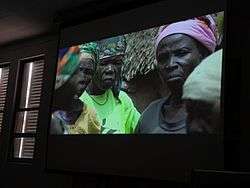Gambaga Witch camp

Gambaga Witch camp is a segregated community within Gambaga township in the Northern Region of Ghana established in the 18th century to accommodate alleged witches and wizards who are banished from their communities.[1][2][3]
The camp has about 25 round huts, and holds about 100 women. No health services or indoor plumbing are available.[4]
Many women in Ghana's witch camps are widows and it is thought that relatives accused them of witchcraft in order to take control of their husbands' possessions.[5] Other old women in the camp have been accused of using black magic to cause misfortunes in their community.[6] Many women also are mentally ill, a little understood problem in Ghana.[5] In Gambaga, the women are given protection by the local chieftain and in return, pay him and work in his fields.[7]
Recent mentions on the Gambaga Witch camp
- The Brong Ahafo regional youth organiser of the New Patriotic Party, Kwame Baffoe has likened those who do not understand the party's controversial free SHS education policy to witches who should be sent to the Gambaga witch camp to understand the practicality of the policy.[8]
- The former first lady of Ghana, Lordina Mahama donated assorted items to the alleged witches in the camp for their upkeep during her tour to the northern sector of the country.[9]
See also
References
- ↑ de Trey-White, Simon (June 23, 2007). "The Witches of Gambaga: Belief in Witchcraft Is Still Widespread in Africa, and Being Accused of Its Practice Can Be a Death Sentence. and with Traditional Gender Roles Being Challenged, Such Accusations Are Becoming Increasingly Common. Simon De Trey-White Visits a Camp in Ghana That Has Housed 'Convicted' Witches for More Than 200 Years". Geographical. Retrieved 21 November 2014 – via HighBeam. (Subscription required.)
- ↑ Sullivan, Tim (11 January 1998). "A Prison Sometimes a Haven: Ghana's Witch Villages Only Safe Place for Women Accused of Casting Spells". Associated Press. Rocky Mountain News (Denver, CO). Retrieved 21 November 2014 – via HighBeam. (Subscription required.)
- ↑ Djanie, Akua (January 1, 2013). "Africa for Halloween?". New African. Retrieved 21 November 2014 – via HighBeam. (Subscription required.)
- ↑ Npong, Francis (2014). "Witch Camps of Ghana". Utne Reader (Winter): 48–49. Retrieved 10 January 2015.
- 1 2 "Ghana witch camps: Widows' lives in exile". BBC. 1 September 2012. Retrieved September 1, 2012.
- ↑ "Hundreds of women trapped in Ghana's 'witch camps'". Telegraph.co.uk. Retrieved 2017-03-18.
- ↑ "Ghana: the Witches of Gambaga". London: Yaba Badoe. 25 November 2010. Retrieved September 1, 2012.
- ↑ "'Those against free SHS must be sent to the witches camp' - Abronye DC". www.ghanaweb.com. Retrieved 2017-03-18.
- ↑ Allotey, Godwin Akweiteh (2016-11-28). "Lordina Mahama visits Gambaga Witches camp". Ghana News. Retrieved 2017-03-18.
External links
- Video by Yaba Badoe about women in Ghanaian camps
- Dispatches Saving Africa's Witch Children
- Witch Child Documentary
Coordinates: 10°31′50″N 0°26′32″W / 10.53056°N 0.44222°W